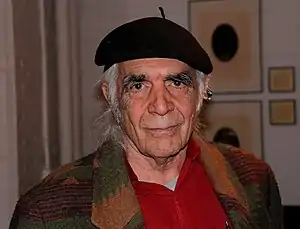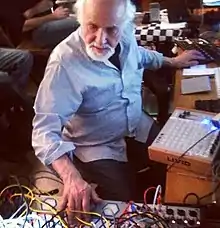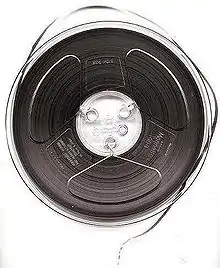

The San Francisco Tape Music Center, or SFTMC, was founded in the summer of 1962[1] by composers Ramon Sender and Morton Subotnick as a collaborative, "non profit corporation developed and maintained" by local composers working with tape recorders and other novel compositional technologies, which functioned both as an electronic music studio and concert venue.[2] Composer Pauline Oliveros,[3] artist Tony Martin and technician William Maginnis eventually joined the SFTMC.
The SFTMC was an active and important hub for experimental music and interdisciplinary art in the Bay Area from 1962 to 1966.
History
San Francisco Conservatory of Music
Before the SFTMC was officially established, it began as a small music studio built in the attic of the San Francisco Conservatory of Music by Ramon Sender in October 1961.[4] The studio was minimally equipped and housed little else than the conservatory's two-channel Ampex tape recorder, but Sender and fellow Sonics composers creatively explored the limitations of the studio by using contact microphones to augment their recordings in an experimental manner.[5]
The Sonics series
The concert series that also paved the way to the creation of the SFTMC, titled Sonics, was organized by Sender and Pauline Oliveros, a fellow composition student of Robert Erickson. The first Sonics concert of December 1961 consisted of original tape compositions by Oliveros, Sender, Terry Riley and Philip Winsor as well as a collaborative live improvisations.[6][7] The sixth and last concert of the series took place on June 11, 1962.[8]
Activities
The premiere of Terry Riley's seminal minimalist composition In C was performed at (and organized by) the SFTMC on November 4 and 6, 1964. It was performed by Riley, Steve Reich, Jon Gibson, Pauline Oliveros, Stuart Dempster, Morton Subotnick, Warner Jepson and others, while Tony Martin operated the light show or "visual environment".
The SFTMC members, particularly Morton Subotnick, were instrumental in the creation of the Buchla analog modular synthesizer.
Later years
Over the course of four years, the SFTMC changed locations twice, first to 1537 Jones Street and then to 321 Divisadero Street, before the Rockefeller Foundation awarded a $200,000 grant to Mills College to bring the SFTMC to Mills and merge it with the Mills Performing Group, where it eventually became the Mills Tape Music Center. Pauline Oliveros, Tony Martin and William Maginnis collectively served as directors for the new center, which is now the Center for Contemporary Music (CCM).[9][10]
References
- ↑ Bernstein, David W. (2008). The San Francisco Tape Music Center: 1960s Counterculture and the Avant-Garde. Berkeley: University of California Press. p. 271. ISBN 978-0-520-24892-2. OCLC 174500759.
- ↑ Bernstein 2008, pp. 9, 14
- ↑ Rogers, Jude (23 April 2021). "Sisters With Transistors: inside the fascinating film about electronic music's forgotten pioneers".
- ↑ Bernstein 2008, p. 262
- ↑ Bernstein 2008, p. 271
- ↑ Bernstein 2008, pp. 10-12
- ↑ Pinch, Trevor; Trocco, Frank (2004). Analog Days: The Invention and Impact of the Moog Synthesizer. Harvard University Press. p. 36. ISBN 978-0-674-01617-0. OCLC 842264489.
- ↑ Bernstein 2008, p. 270
- ↑ Bernstein 2008, p. 14, 18, 34
- ↑ "Center for Contemporary Music | Mills College". www.mills.edu. Retrieved 2020-04-01.
External links
- EMF Institute: SFTMC
- The Electronic Music Men by Edwina Bowe, San Francisco Chronicle (March 22, 1964)
- The San Francisco Tape Music Collective
